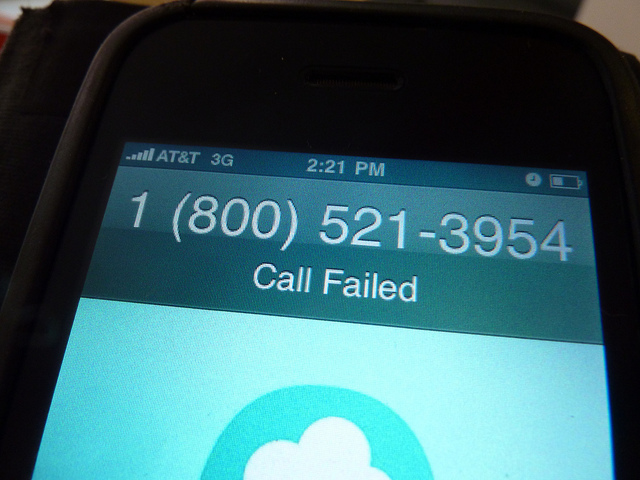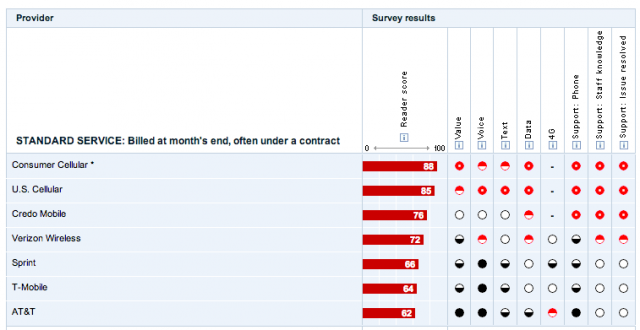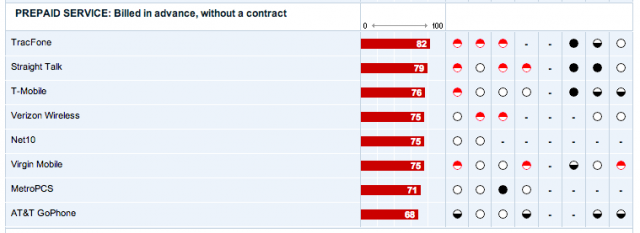
Each year, Consumer Reports surveys some 60,000 cell phone subscribers to find out which service providers are the best and worst. AT&T is on a real hot streak in these rankings—a hot streak of finishing dead last in customer satisfaction.
AT&T did score one real win in the latest rankings, released today, with its 4G service being rated better than all of its competitors. "Its users reported the fewest problems with that higher-speed service, which most new smart phones now use," Consumer Reports noted. But AT&T was the worst or tied for worst in all other categories, including value, voice, text, data, and support. AT&T's overall score for standard service customers was 62 out of 100. That's just behind rivals Sprint and T-Mobile, well behind Verizon Wireless, and even further behind small carriers Consumer Cellular, US Cellular, and Credo Mobile:

Scores were based on responses from 63,235 ConsumerReports.org subscribers who were surveyed in September 2012. The above rankings are for standard service, the type billed at the end of the month, often under a contract. AT&T was also last in its prepaid service:

AT&T finished last among the four major carriers in a bunch of major cities too, including Atlanta, Austin, Boston, Dallas-Fort Worth, and Denver. (Verizon lead the way in all those cities.) Sprint wrestled away the worst service crown from AT&T in Chicago, a city in which US Cellular is tops.
Consumer Reports cautions that differences of five points in score are not meaningful. So you could say Sprint, T-Mobile, and AT&T were tied for last in standard service. Consumer Reports thus described AT&T as being only "among the lower-scoring providers" for 2012. But the trend for AT&T is hard to ignore. One year ago, Consumer Reports said AT&T was rated worst carrier for the second year in a row, giving it the crown in 2010 and 2011. AT&T was also the worst in 2009, when it was the sole iPhone provider, according to a New York Times report from that year. In 2009 however, perhaps AT&T finished last by a small enough margin to escape Consumer Reports' official "lowest" designation.
Verizon Wireless topped the rankings of major carriers in 2009 and continued to do so every year since. But AT&T is trying to look on the bright side. "While delivering an even better customer experience is a never-ending job, we're pleased that our customers rate their 4G experience as best of any carrier," an AT&T spokesperson told Ars in an e-mailed statement. "We’ve invested significantly to deliver unique advantages, including offering the nation’s largest 4G network, which enables the fastest iPhone 5 downloads and simultaneous talk and surf."
Consumer Reports noted that Verizon Wireless led major carriers with "favorable scores for voice and data service quality, and also for support attributes like staff knowledge and resolution of issues." But Verizon's score of 72 was easily bested by US Cellular and Consumer Cellular's scores of 85 and 88, respectively. Put another way, both Consumer Cellular and US Cellular beat Verizon by larger margins than Verizon beat AT&T.
"US Cellular was top-rated almost across the board but isn’t nationally available and has only two high-profile phones, the Samsung Galaxy S III and Galaxy Note II," Consumer Reports said. "But if either phone appeals, this carrier is worth considering if you live in one of the 24 states where it’s available (in the Midwest, Pacific Coast, and parts of New England and the South). Plan pricing tends to be on a par with AT&T, but readers judged US Cellular to be a much better value than any of the four biggest carriers."
AT&T's 4G victory is an important one, and well worth crowing about (even though AT&T courted controversy by temporarily limiting Apple's FaceTime video chat technology over LTE). AT&T won't lose its status as one of the two biggest US carriers anytime soon, but lagging behind Verizon year after year in most customer satisfaction metrics can't be helping the company attract new subscribers.
What's the best choice? Depends what you're looking for
Consumer Reports calls Verizon the best bet for customers looking for the most advanced technology and strong nationwide data service. AT&T isn't a bad choice for people looking for marquee phones, either, despite its low satisfaction scores. "With its superior scores and wide array of marquee phones, Verizon is your best bet overall among national carriers. AT&T, though it rates lower than Verizon in most respects, is also worth considering for want-it-all types because of its top 4G network rating and lower pricing for people who have lighter data, voice, and messaging needs," Consumer Reports said.
If you need 2GB of data per month as well as unlimited voice and texting, AT&T ends up being more expensive, the report said. Across all carriers, top-tier smartphones and service usually cost about $2,500 or more over a two-year period.
If you're buying for a crowd rather than just yourself, Consumer Reports advises to "Consider US Cellular if you live in its service area. It was one of the top carriers in the Consumer Reports National Research Center annual survey, which covered 23 metro areas. It offers one of the lowest-priced family plans—$190 a month for a family needing two basic and two smart phones. The plan includes 2,000 voice minutes, unlimited messages, and 4GB of data service."
If you want smartphone features but not necessarily the best and most expensive devices, the advice is to "buy a smart phone that performs well, maybe an older model. Use it with an inexpensive unlimited voice, texting, and data plan from a no-contract carrier with standout scores for data service. Two-year cost for phone and service: about $1,500 and up." One option in this category is "prepaid Straight Talk, which was more satisfying overall than contract service from any major carrier."
If you're looking for just the basics, perhaps even a phone that's not a smartphone (the horror!) then Consumer Cellular may be your best bet. The carrier uses the AT&T network, while offering a $15 plan with 150 voice minutes a month, $30 for 750 minutes, and as little as $2.50 for 100 text messages per month.
One other tidbit noted by Consumer Reports is the cost of upgrading early among major carriers. If you're a Verizon customer and want to upgrade to a 16GB Samsung Galaxy SIII halfway through your two-year contract, the cost is $600, including upgrade fees and penalties. Doing the same on AT&T or T-Mobile costs $486 or $483, respectively. Sprint charges $586 for the early upgrade.
reader comments
101